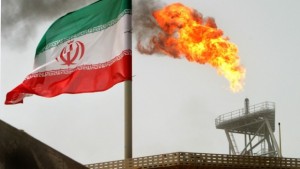 (Reuters) - The U.S. Congress could soon pass a bill to further squeeze Iran's oil exports - and its nuclear program - but new sanctions may fail to cut the country's crude sales much more than existing ones already have.
(Reuters) - The U.S. Congress could soon pass a bill to further squeeze Iran's oil exports - and its nuclear program - but new sanctions may fail to cut the country's crude sales much more than existing ones already have.The Senate Banking Committee this month is expected to begin debating its version of a package of sanctions that easily passed in the House of Representatives in late July. The House bill would cut Iran's exports to global customers by an additional 1 million barrels per day in a year, on top of U.S. and European Union sanctions that have about halved Tehran's oil sales since 2011.
The U.S. government believes Iran's nuclear program will soon have the ability to develop weapons and that further reducing the country's oil sales could shut the program down by starving it of funding.
Deeper cuts in Iran's oil sales, if accomplished, could worsen the damage Western sanctions have already done to Iran's�economy, which suffered a loss of about $26 billion in petroleum revenue in 2012 from a total of $95 billion in 2011; soaring inflation; and a devaluation of its currency, the rial.
Tehran says its nuclear program is for generating electricity and medical devices.
Senators from both parties have begun private talks on closing loopholes in existing sanctions, forcing reductions in Iran's oil sales at a faster pace than the House bill would and ending the ability of the State Department to waive sanctions on Iran's oil customers, aides said.
Many want to pass tougher sanctions to show Iran's new president, Hassan Rouhani, a relative moderate, that Washington is serious about pressuring the nuclear program.
But existing sanctions - which push countries including�China, India,�Japan�and�South Korea�to reduce their imports of Iranian oil by threatening to cut their�banks�off from the U.S. financial system - may have already gone as far as they can without antagonizing the countries.
"Congress can pass anything it wants, but the president is not going to be able to implement it," Amy Myers Jaffe, an expert in energy and geopolitics at the University of California, Davis, said of tougher sanctions efforts.
OIL PRICES ON REBOUND
The high price of oil is not helping. Hopes that the sanctions could deliver a serious blow to Iran's nuclear program were high in June 2012 when international Brent crude prices fell below $90 a barrel, even at a time of high seasonal demand and as Washington raised pressure on�Iran.
Lower prices help sanctions work by cutting the revenue�Iran�gets from its reduced crude oil sales. Low prices can also ease cooperation between Iran's oil-consuming countries and Washington, while higher crude prices can make it hard to crack down on oil sales from a country with enormous crude resources.
Brent oil prices are now much higher, at about $108 a barrel, though down from $117 earlier this month. Production outages in�Libya,�Iraq, Nigeria and other countries have cut some 3 million barrels per day, or about 3.5 percent of global demand, from the market.
Deeper cuts could also be hard to pull off given the efforts by President Barack Obama administration since early 2011 to persuade Iran's top oil consumers to find alternative sources of crude. Reductions in purchases of Iranian oil by China,�Japan�and South Korea were steep in 2012 but have mostly leveled off.
With Washington hoping to avoid creating diplomatic spats with large countries at a time of rising tensions across the Middle East and North Africa, now may not be the right time to remove flexibilities in the way sanctions have been working.
"The labor strikes in Libya and increased tension with�Syria�highlight the importance of giving the Obama administration flexibility in how hard and how fast to pressure other countries to reduce imports from Iran," said Trevor Houser, a former State Department adviser now at Rhodium Group, a New York policy and economic consultancy.
TALKS IN THE SENATE
Backers of tougher sanctions in the Senate say the House version waits too long - up to 90 days - to force new reductions in Iran's oil sales.
Several senators also want the new bill to require Iran's oil-consuming countries to make specific, documented reductions in their crude purchases, an aide said. The approach could require countries to cut by a certain percentage soon after the bill became law, and the percentages would rise every few months.
It would be a contrast to current practice, which only requires consuming countries to make "significant," but undefined, cuts in the purchases of Iranian crude.
"The devil will be in the details - how much oil each period and what is the length of each staged period of time," the senate aide said.
Other senators say the approach would not work because the consuming countries do not want to telegraph to the world how much they are cutting, or will cut, their purchases, for competitive reasons.
"For sanctions to work, to be biting, they must be multilateral, not unilateral, and that requires buy-in and cooperation from other nations," said another senate aide. "Calling out specific countries and targeting them in such a way to hit a benchmark doesn't adhere to this multilateral approach," he said.
Sanctions that seek further dramatic cuts to Iran's oil exports could be a "bridge too far," and one that the Obama administration is unlikely to make China, Iran's biggest oil customer, cross given the importance of Beijing's cooperation in efforts to address the Iranian nuclear issue, said Houser.
By Reuters
The Iran Project is not responsible for the content of quoted articles.










